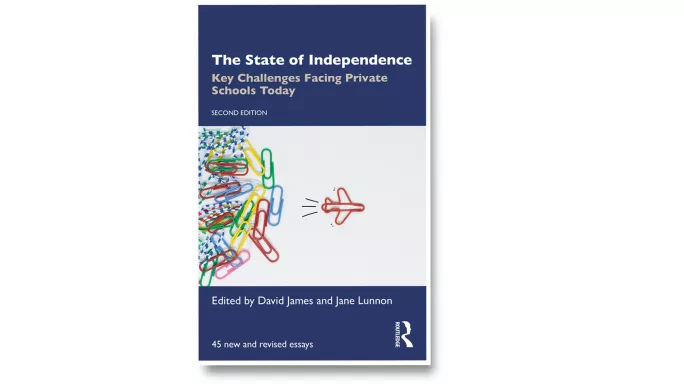
- Home
- Analysis
- Specialist Sector
- 4 ways private education could make itself (almost) affordable again
4 ways private education could make itself (almost) affordable again

Independent schools, as we know, educate only 7 per cent of the children in the United Kingdom.
I was once one of those 7 per cent, my husband had also been independently educated, and we aspired to provide that education for our three children.
We wrote our first cheque for independent school fees in 1991, when our eldest was not yet 3 (£500 for a term at a nursery school in central London), and wrote the last one in 2018 (£12,500 for a term at a boarding school in Oxford).
During that time, we have done everything (legal) you could think of to pay the fees. Paid them in advance to get a discount, used instalment payments when times were tougher, borrowed the money through remortgaging, taken on second jobs, you name it.
Over the time that we were paying them, independent school fees in the United Kingdom rose by more than twice the amount of wages in the country.
Is this sustainable? I doubt it.
At this rate, the only people able to afford an independent education for their children will be the very wealthy, and the teachers who work at those schools and get fee discounts. That doesn’t sound like a very balanced set of students to me.
The solution? I am not sure that there is any one solution. I believe that a whole range of initiatives needs to be considered if independent schools are to continue to be viable (and available) to parents in the United Kingdom.
Here, I set out four ideas that I believe are worthy of debate and development.
1. New models of loan
First, new models of loans for parents. Parents often have assets (home equity, future inheritance), or future expectations of income (bonuses, increased pay), that would suggest that they could pay for school fees through borrowing. But the current options for doing this are very limited.
The most easily available model for instalments sees the annual school fees, plus an interest charge, divided by 12 and taken monthly by direct debit.
This only spreads the repayment over one calendar year, which, while more manageable for many than three major cash demands, doesn’t really extend the time horizon meaningfully over the parents’ earning expectancy.
The only current proxy is to take out extensions to mortgages, which is not really a sensible way of matching assets to liabilities. Long-term (10+ year) loans secured on property or other tangible assets, specifically for school fees, could see grandparents act as guarantors where necessary.
Will someone out there please develop this product?
2. Learning from budget airlines
Second, we could consider new models of independent school. I have watched with interest the continued expansion of low-cost private schools in developing nations. In India and Africa for example, there has been an explosion of provision since 2005.
Just as there is demand in the United Kingdom for the stripped-down service of budget airlines, so there may well be demand for a school that doesn’t offer the most well-equipped language labs, swimming pools and wellbeing centres but just focuses tightly on their pupils achieving five GCSEs at grades 9-4.
These could be free schools (for those readers outside the United Kingdom, these are - confusingly - state-sponsored schools that are “free” of local authority management) or even private schools, that decide to cut extras to the bone to make them affordable.
I suspect there is a significant market for people who would not be concerned about the absence of a polo field!
I am particularly struck by the King’s School for Mathematics, a state-school sixth form founded by King’s College London to address the pipeline of talented pupils in STEM subjects.
Its sixth intake completed its studies in 2021. Seventy-eight per cent of all A levels achieved were A* grades, 95 per cent were A*/A and 100 per cent were A*/A/B. Even more critically, each student on average did more than one whole grade better than the GCSE grades they had been predicted.
True, there is a restricted range of A levels, and purists would argue that they are missing out on not rubbing shoulders with people studying Latin or dance, but their curriculum includes personal development and a whole range of extension activities.
I predict more schools where this came from, and not just in the state sector.
3. Better bursary offers
Third, there could be new models of bursary provision. Well-capitalised schools with access to substantial endowments (eg, Eton), run extensive bursary schemes to ensure that they are not just educating the children of the wealthy, and those of their own staff.
Even King’s School for Mathematics gives travel bursaries - and other financial support - to all who need it.
Christ’s Hospital runs, in effect, a means-tested fee scheme - it provides more bursary support to its pupils than any other school in the independent boarding sector and has done for over 460 years.
Bursaries are granted to 75 per cent of students, who receive between 5 and 100 per cent assistance with their boarding fees according to their household income. Families on very low incomes may also be assisted with the cost of extras, including pocket money.
But how can a school achieve the endowment funds needed to provide such access? Here, I would look to the United States, where every private university works assiduously with its alumni to raise money for future funding.
The time to start doing that is before pupils have even left school - every leaving class could raise a class gift, and compete with the previous year to better it. My alma mater, the London Business School, does this to great effect.
Students could undertake sponsored activities and events to raise the funds, and if that interferes too much with A-level revision (or Netflix viewing) then I am sure the odd parent would write a cheque.
4. Changes to capital provision
And finally, schools should consider new models of capital provision.
One of the fascinating facts for anyone logging onto the Charity Commission’s beta site is that you can obtain the most recent accounts from any of the United Kingdom’s independent schools operating as a charity (ie, most of them).
The “financials” analysis shows how much of the fee income is being spent on educating your children and how much on servicing debt. I suspect that parents would prefer schools to spend most of their current income on their children.
Given the debt burden of many, indeed most, independent schools, I would encourage those of sufficient size and asset base to investigate the long-term bond market - here at Heriot-Watt University, we have issued very long-dated bonds to retire all existing debt and secure our capital investment programme, including our new Dubai campus, for the foreseeable future.
The terms of such an instrument are much more conducive for longer-term capital planning than a standard bank loan, and could reduce the servicing costs that are being covered by parents in their fees.
I would also suggest that schools add onto the bill each term, a small contribution for capital expenditure and then invite parents to remove the item if they wish.
All UK tax-paying parents should sign gift aid forms when their child starts in the school. I introduced this when I was a parent governor at a prep school over a decade ago and I believe the school has used it ever since to service capital borrowing.
I hope that these ideas have been food for thought. None of them alone will solve the affordability question overnight, and even all four put together will not provide the complete answer. But radical thinking is needed if independent education is going to be accessible, even for the 7 per cent.
Professor Dame Heather McGregor DBE FRSE is provost and vice principal at Heriot-Watt University Dubai
The above is an edited extract from The State of Independence, second edition, published by Routledge. Tes readers can receive 20 per cent off by using the code TES, valid until 31 March 2023

You need a Tes subscription to read this article
Subscribe now to read this article and get other subscriber-only content:
- Unlimited access to all Tes magazine content
- Exclusive subscriber-only stories
- Award-winning email newsletters
- Unlimited access to all Tes magazine content
- Exclusive subscriber-only stories
- Award-winning email newsletters
You need a subscription to read this article
Subscribe now to read this article and get other subscriber-only content, including:
- Unlimited access to all Tes magazine content
- Exclusive subscriber-only stories
- Award-winning email newsletters
- Unlimited access to all Tes magazine content
- Exclusive subscriber-only stories
- Award-winning email newsletters
topics in this article



